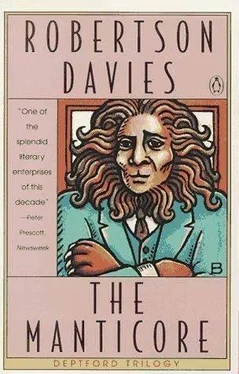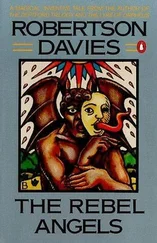Robertson Davies - The Manticore
Здесь есть возможность читать онлайн «Robertson Davies - The Manticore» весь текст электронной книги совершенно бесплатно (целиком полную версию без сокращений). В некоторых случаях можно слушать аудио, скачать через торрент в формате fb2 и присутствует краткое содержание. Жанр: Триллер, на английском языке. Описание произведения, (предисловие) а так же отзывы посетителей доступны на портале библиотеки ЛибКат.
- Название:The Manticore
- Автор:
- Жанр:
- Год:неизвестен
- ISBN:нет данных
- Рейтинг книги:3 / 5. Голосов: 1
-
Избранное:Добавить в избранное
- Отзывы:
-
Ваша оценка:
- 60
- 1
- 2
- 3
- 4
- 5
The Manticore: краткое содержание, описание и аннотация
Предлагаем к чтению аннотацию, описание, краткое содержание или предисловие (зависит от того, что написал сам автор книги «The Manticore»). Если вы не нашли необходимую информацию о книге — напишите в комментариях, мы постараемся отыскать её.
The Manticore — читать онлайн бесплатно полную книгу (весь текст) целиком
Ниже представлен текст книги, разбитый по страницам. Система сохранения места последней прочитанной страницы, позволяет с удобством читать онлайн бесплатно книгу «The Manticore», без необходимости каждый раз заново искать на чём Вы остановились. Поставьте закладку, и сможете в любой момент перейти на страницу, на которой закончили чтение.
Интервал:
Закладка:
He was very good about sex. It was pleasure: yes. It could be a duty: yes. But it wasn't divorced from the rest of life, and what you did sexually was of a piece with what you did in your friendships and in your duty to other people in your public life. An adulterer and a burglar were bad men for similar reasons. A seducer and a sneak-thief were the same kind of man. Sex was not a toy. The great sin – quite possibly the Sin against the Holy Ghost – was to use yourself or someone else contemptuously, as an object of convenience. I saw the logic of that and agreed.
There were problems. Not everybody fitted all rules. If you found yourself in that situation you had to do the best you could, but you had to bear in mind that the Sin against the Holy Ghost would not be forgiven you, and the retribution would be in this world.
The brighter members of Knoppy's Confirmation classes knew what he was talking about at this point. It was clear enough that he was himself a homosexual and knew it, and that his work with boys was his way of coping with it. But he never played favourites, he was a dear and thoroughly masculine friend, and there was never any monkey-business when he asked you to his rooms. I suppose there are hundreds like me who remember him with lasting affection and count having known him as a great experience. He stood by me during my early love-affair in a way I can never forget and which nothing I could do would possibly repay.
I wish we could have remained friends.
6
People jeer at first love, and in ridiculous people it is certainly ridiculous. But I have seen how hot its flame can be in people of passionate nature, and how selfless it is in people who are inclined to be idealistic. It does not demand to be requited, and it can be a force where it is obviously hopeless. The worst fight I saw in my schooldays was caused when a boy said something derogatory about Loretta Young; another boy, who cherished a passion for the actress, whom he had seen only in films, hit this fellow in the mouth, and in an instant they were on the ground, the lover trying to murder the loudmouth. Our gym master parted them and insisted that they fight it out in the ring, but it was hopeless: the lover ignored all rules, kicked and bit and seemed like a madman. Of course nobody could explain to the master what the trouble was, but all of us supposed it was a fight about love. What I know now was that it was really a fight about honour and idealism – what Dr. von Haller calls a projection – and that it was a necessary part of the spiritual development of the lover. It may also have done something for the fellow who was so free with the name of Miss Young.
I fell in love, with a crash and at first sight, on a Friday night in early December of 1944. I had been in love before, but trivially. Many boys, I think, are in love from the time they are able to walk, and I had cherished my hidden fancies and had had my conquests, of whom Toad Wilson was by no means the best example. Those were childish affairs, with shallow roots in Vanity. But now I was sixteen, serious and lonely, and in three hours Judith Wolff became the central, absorbing element in my life.
Caroline's school, named for a Bishop Cairncross who had been a dominant figure in the nineteenth-century life of our Canadian province, had a reputation for its plays and its music. Every school needs to be known for something other than good teaching, and its Christmas play was its speciality. In the year when I was sixteen the school decided to combine music and drama and get up a piece by Walter de la Mare called Crossings . I heard a good deal about it because it had a lot of music and four songs in it, and Caroline was to play the piano off stage. She practised at home and talked about the play as if it were the biggest musical show since Verdi wrote Aida for the Khedive of Egypt.
I read the playbook she had to work from, and I did not think much of it. It was certainly not in the Plain Style, and I was now much under the influence of Ramsay's enthusiasm for unadorned prose. It was not a Broadway kind of play, and I am not certain it is even a good play, but it is unmistakably a poet's play, and I was the most deeply enchanted of an audience that seemed, in a variety of ways suitable to their age and state of mind and relationship to the players or the school, to be delighted by it.
It is about some children who are left to their own devices because of a legacy. They have an aunt who has strict educational theories and expects them to get into hopeless messes without her guidance; instead they have some fine adventures with strange people, including fairy people. The oldest child is a girl called Sally, and that was Judith Wolff.
Sally is very much a de la Mare girl, and I don't think I ever saw Judith except through de la Mare eyes. The curtain went up (or rather, was drawn apart with a wiry hiss) and there she sat, at a piano, precisely as the poet describes her in the stage directions – slim, dark, of mobile face, speaking in a low clear voice as if out of her thoughts. She had a song almost at once. The illusion that she was playing the piano was not successful, because the sound was plainly coming from Caroline backstage, and her pretence to be playing was no better than it usually is. But her voice made shortcomings of that sort irrelevant. I suppose it was just a charming girl's voice, but I shall never know. It was a voice that seemed to be for me only in all the world. I was engulfed in love, and I suppose I have been in love with Judith ever since. Not as she is now. I see her from time to time, by chance; a woman of my own age, still gravely beautiful. But she is a Mrs. Julius Meyer, whose husband is an admired professor of chemistry, and I know that she has three clever children and is an important figure on the committee of the Jewish hospital. Mrs. Julius Meyer is not Judith Wolff to me, but her ghost, and when I see her I get away as fast as possible. The David Staunton who fell in love still lives in me, but Judith Wolff – the girl of the de la Mare play – lives only in my memories.
Judith had two songs in Crossings . She acted as she sang, with a grave natural charm, and was much, much, much the best of the girls in the play.
There were people who thought differently. As always at these affairs, there were people who thought the girls who played masculine parts were wildly funny, and I suppose that when they turned their whiskered, carefully made-up faces away, and we saw their girl-shaped bottoms, it was funny if that is where you find your fun. There was much applause for a small blonde girl played the Queen of the Fairies; she acted with a sweetness which I thought painfully overdone. There was a ballet of fairies, very pretty as they danced through a snow-scene, holding little lanterns; there were plenty of parents with eyes only for a special fairy. But I saw nothing clearly but Judith, and in justice to the audience generally I must say that they thought that she was – always excepting their own child – the best. For the curtain call the stage was filled with the whole cast, and also the inevitable clown assembly of mistresses in sensible shoes who had helped in some way, looking as such helpers always do, too big and too clumsy to have had anything to do with creating an illusion. Judith Stood in the centre of the first line, and it seemed to me that she was aware of her popularity and was blushing at it.
I applauded uproariously, and I noticed some parents looking approvingly at me. I suppose they thought I was clapping for Caroline and was a loyal brother. Caroline was on the stage, certainly, holding the score of the music so people would know what she had done, but I had no eyes for her. After the party for the cast and friends – school coffee and school cookies – I took Caroline home and tried to find out something about Judith Wolff. She had been surrounded by some foreign-looking people whom I supposed to be her parents and their friends, and I had not been able to get a good look at her. But Caroline was full of herself, as always, and demanded again and again that I reassure her that the music had been suitably audible, yet not too loud, and had supported the weaker singers without seeming to dominate them, and had really carried the ballet, who were just little girls and had no more sense of rhythm than so many donkeys, and had indeed been fully orchestral in effect. This was egotistical nonsense, but I had to put up with it in order to bring the conversation around to what I wanted to know.
Читать дальшеИнтервал:
Закладка:
Похожие книги на «The Manticore»
Представляем Вашему вниманию похожие книги на «The Manticore» списком для выбора. Мы отобрали схожую по названию и смыслу литературу в надежде предоставить читателям больше вариантов отыскать новые, интересные, ещё непрочитанные произведения.
Обсуждение, отзывы о книге «The Manticore» и просто собственные мнения читателей. Оставьте ваши комментарии, напишите, что Вы думаете о произведении, его смысле или главных героях. Укажите что конкретно понравилось, а что нет, и почему Вы так считаете.












